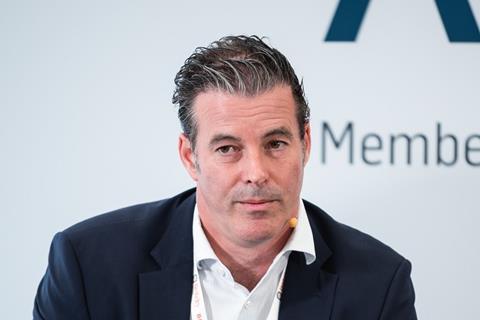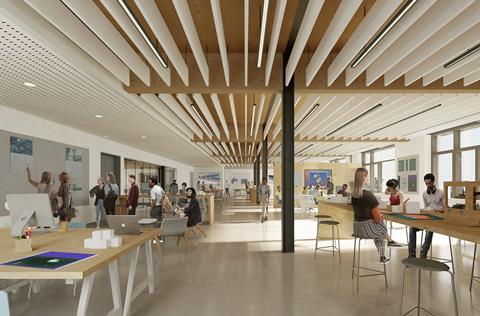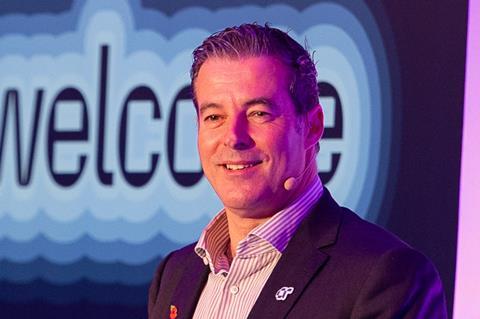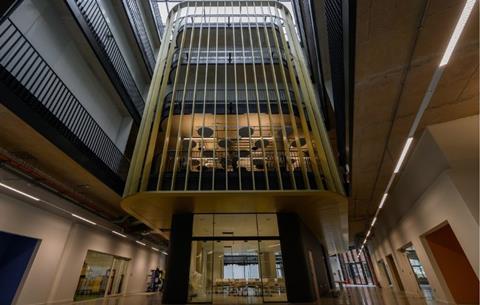The Canadian engineering services giant which owns Atkins and Faithful+Gould has completely rebranded as it seeks to put past problems behind it and focus on growth. The group’s UK president tells Carl Brown about his strategy for success

“And then, here at Atkins…[pause] Réalis, I nearly missed that!”, says Richard Robinson with a laugh as he realises he is still not always in the habit of remembering to use his company’s new name. Sometimes a rebrand can take a while to sink in after all.
Think Marathon becoming Snickers, Opal Fruits morphing into Starburst or, more recently, Twitter transforming itself into X. New names can take a while to get used to even if you are the president for UK & Ireland of a huge firm that has dramatically rebadged itself in the past few months.
The rebranding of Canadian engineering services firm SNC Lavalin Group as AtkinsRéalis – along with its subsidiaries, including household UK names Atkins and Faithful+Gould – made headlines last September.
Following another recent restructure, which has seen Robinson’s role recently re-badged as president of UK & Europe, we caught up with the AtkinsRéalis’ executive to talk about the rebrand and the engineering firm’s plans for the future in the UK and elsewhere.
Robinson, clearly and understandably a very busy man, joins us around 20 minutes late, looking initially slightly distracted after a previous meeting.
The rebrand
Speaking to Building in his firm’s imposing and divisive Nova North headquarters, a spitting distance from Buckingham Palace, Robinson is nevertheless upbeat about what he describes as a “momentous year” for the group, which turned over CA$8bn (£4.6bn) globally in 2023.
Slowly and almost hesitantly at first, he says that companies quite often rebrand before they start to transform, whereas SNC Lavalin has done it at the end of the process, having acquired WS Atkins in 2017.
Richard Robinson CV
2024-present President, UK and Europe, AtkinsRéalis
2019-24 Chief executive officer, Atkins / AtkinsRéalis
2018-19 Chief operating officer, HS2
2011-18 Various executive roles, Aecom
2009-11 Managing director, Heathrow Express
1995-2002 Various roles, ICI Acrylics
“It’s the end result of all the transformation and integration we’ve done globally since the businesses were brought together,” he says. “A number of brands with an awful lot of longevity have been retired in favour of one global brand, with a new fresh look, and the whole energy it has created in the business has been really quite something special.”
The move to retire the SNC Lavalin name was widely seen in the international press as a move by the company to leave behind its recent controversial past, which has seen it embroiled in the Libya corruption scandal in the 2000s and post poor results due in part to costly over-budget rail contracts.
Ian Edwards, overall president and chief executive, recently said the company had reached an “inflection point”, having exited unprofitable parts of the business to focus on high-growth markets, with the rebrand reflecting this.
It’s an amalgamation of everything we have – the two big parts of the business and the history all in one name
Robinson understandably swerves any talk of the parent company’s difficult past, but he is at pains to stress the new name does not erase the SNC Lavalin connection entirely.
He says the accent above the “e” in Réalis is a nod to SNC Lavalin’s Montreal French-Canadian roots, while the word “Réalis” resembles “realise”, meaning to make things happen, appropriate for the firm’s focus on delivering projects. “It sounds very marketing,” Robinson admits, chuckling.
But he adds: “It’s an amalgamation of everything we have – the two big parts of the business and the history all in one name. I think that extra special thought that’s gone into that has meant it has landed well everywhere.”
AtkinsRéalis in numbers
36,000 employees worldwide
14,000 employees in the UK and Ireland
CA$7.5bn global turnover in 2022 (£4.4bn)
£1.1bn turnover in the UK in 2022
£78.5m pre-tax profit in the UK in 2022
AtkinsRéalis has ended its activities in the oil sector and has shifted away from bidding on fixed-price contracts, but what are the “high-growth areas” the firm is now focused on?
Areas of growth
Robinson says globally the firm has three key capabilities: engineering and design, projects and programme management and consulting and advisory. The UK business makes up around a third of AtkinsRéalis revenue, with Canada and the US the other main areas.
In terms of market focus, transportation, defence and water are singled out by Robinson as key, along with nuclear.
When it comes to transportation, which accounted for 41% of Atkins’ UK income in 2022 – by far the largest area (see pie chart below)– Robinson says the firm is “super strong” in transportation, with clients seeing the firm as a delivery partner.
AtkinsRéalis proportion of UK income by activity
AtkinsRéalis UK income by activity
| Sector | Turnover (£m) |
|---|---|
| Aerospace, defence, security and technology | 214.9 |
| Infrastructure | 214.3 |
| Nuclear | 121.9 |
| Transportation | 457.4 |
| Faithful & Gould | 23.4 |
| Internal trade | 83.1 |
“It is because we have got deep technical knowledge, we have examples where we deliver things on the ground and we are also a signalling design-build installer. So we really understand the sharp end of what happens in rail and getting stuff done on a tight timetable,” he says.
Of course Robinson himself has huge amounts of experience in transport, having served as chief operating officer at HS2 and as managing director of the airport-owned company that operates the Heathrow Express train link.
This has meant he has been well placed as AtkinsRéalis carries out work on HS2 phase 1. “Stuff is happening at a huge scale – if you’ve been seeing any of the projects on the ground, each one is a huge project in its own right,” he says.
When we raise the subject of the government’s cancellation of HS2 phase 2a, Robinson is visibly frustrated. “It’s really disappointing to see as it leaves a hole in the whole network strategy of the North,” he says.
Robinson has not personally been involved in the recent discussions between industry, the Labour party and regional mayors about alternative plans to fund HS2 phase 2a, but he says such a push for a solution is necessary: “I think we have got to do something that looks a lot like 2a, because otherwise we are going to end up with less capacity than we have now, if HS2 services go on to the main route and then there’s a whole question about connectivity of the North.”

Regarding reasons for the rising costs of HS2 in the first place, he says pressure from local communities forced changes which meant much of the line would no longer be built on level land.
“HS2 costs escalated due to decisions during the hybrid bill process, the net result of which is 80% of the route from London to Birmingham is not at grade,” he says. “This means it is either on a viaduct, in a deep cutting or in a tunnel.
“This was to mitigate local concerns, which is a key part of the UK planning process. This does however result in a more costly asset than, say, running at grade through the countryside – as comparable railways in Europe do.”
While the government’s appetite for investing in rail has been called into question, an area it is facing pressure to invest in due to global events is defence, and Robinson says he sees this as a strong area of growth for Atkins.
Everyone has been wrestling with what the energy transition means. Does it mean grid? Does it mean hydrogen? Does it mean solar?
This is for “for obvious reasons – some of them sad reasons, such as the issues in Ukraine”. But the firm is seeing an increase in business for its work on military infrastructure, including the “replacement of the at-sea [nuclear] deterrent and all the associated infrastructure with that”.
Similarly, he says, concern about river pollution and flooding is incentivising investment in the water industry, which is another key area for the firm.
Another important focus is the future for energy and working out what opportunities will come as we look to decarbonise.
“I think everyone has been wrestling with what the energy transition means”, says Robinson. “Does it mean grid? Does it mean hydrogen? Does it mean solar?
“Does it mean other renewables? Does it mean carbon capture and storage (CCS)? Does it mean nuclear? Does it mean fusion?”
Robinson believes we need all of the above, but the order in which these opportunities come to market in different sectors has recently become “an awful lot clearer”.

When pushed for examples, he says: “There’s heavy transport, which doesn’t look like it will work on battery alone. So there is a case for hydrogen.
“There are big chunks of manufacturing, probably in cement production etc, that will require CCS. So we are beginning to see how these things fit together.” Expanding grid capacity is a must, he adds.
Robinson says the Canadian part of the business has “special skills” in energy in other areas, including hydro transmission and distribution and nuclear. “We hold the proprietary design of a nuclear technology of our nuclear business that gives us the credibility in that market,” he says.
While green energy is vital for our future, decarbonising existing properties is as well and Robinson says AtkinsRéalis is involved with the Government Property Agency on a project to decarbonise a large estate. “The stats my people tell me are that 80% of the buildings that are standing today will be around in 2050. So, if anyone doesn’t think retrofit is going to be huge, then the stats would seem to disagree with them.”
Looking ahead to the general election
Robinson is obviously keen to find out how construction can help to deliver government priorities – AtkinsRéalis’ UK business largely depends on it after all – and it is perhaps this concern which has led him to being an influential presence as deputy chair of the Construction Leadership Council (CLC), which works in partnership with government to “lead a new era of delivery in the built environment”.
One of the most powerful things the government could do is to publish that pipeline and then move on some of those projects quickly
So, as we begin to gear up for a general election year, what are Robinson’s hopes and concerns? Most immediately he is disappointed because he felt that the publication of the government’s infrastructure pipeline last month did not give enough clarity and certainty over future work.
“It has only just been republished and doesn’t actually project that far ahead,” he says. “One of the most powerful things government could do is to is to publish that pipeline and then move on some of those projects quickly.
“That’s pretty simple, isn’t it?” he adds.
After speaking to Robinson for nearly an hour it is clear that he knows how to deliver corporate messages in a very thoughtful and considered way, whether as a product of natural caution or media savviness or both it is hard to say. He is nevertheless engaging, although it is not easy to imagine what his leadership style is.

But one of his biggest influences appears to be Sir Jim Ratcliffe, the British billionaire in the headlines recently for purchasing a chunk of Manchester United. Having qualified as a chemical engineer, a young Robinson was working for ICI in Teesside when the firm was broken up, which he said was “due to a failure in its strategy”.
Ratcliffe’s Ineos business bought the part of ICI in which Robinson was working. Ratcliffe then, according to Robinson, transformed it due his “can-do” attitude, with a “dynamic” and action-orientated approach.
“Ratcliffe began to change the environment and it became a fantastic place for work, and it got me interested in business and thinking, ‘I would like to do that’.
“I was inspired to become the leader of a UK engineering or manufacturing business and to make sure that what happened to ICI didn’t happen to another company.”
So, as AtkinsRéalis moves on to its next chapter and attempts to leave its troubles in the past, the group’s global leaders will certainly be hoping that some of the Ratcliffe magic and ability to grow the business has rubbed off on his protégé.



























No comments yet